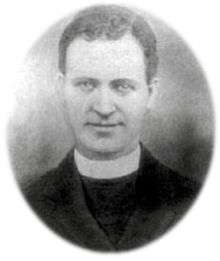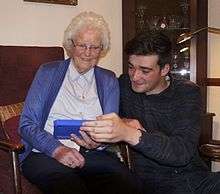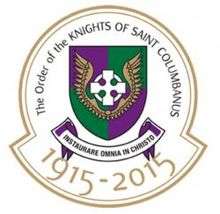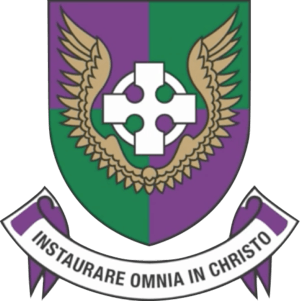Knights of Saint Columbanus
|
Knights of St. Columbanus Logo | |
| Abbreviation | KSC |
|---|---|
| Motto |
Instaurare omnia in Christo (To restore all things in Christ) |
| Formation | April 10, 1915 |
| Type | Catholic fraternal organisation |
| Headquarters | Ely House, Ely Place, Dublin |
Founder | Canon James Kearney O'Neill |
Supreme Knight | Barry C. MacMahon |
Supreme Chaplain | Rgt Rev. Mgr. Gerard Dolan PP. VG. |
| Affiliations | International Alliance of Catholic Knights |
| Website | knightsofcolumbanus.ie |
The Order of the Knights of Saint Columbanus (Irish: Ridirí Naomh Cholumba[1]) is an Irish national Catholic fraternal organisation. Founded by Canon James K. O'Neill in Belfast, Northern Ireland in 1915, it was named in honour of the Irish saint, Saint Columbanus. Initially established as a mutual benefit society to working class Catholics, it has developed into a fraternal benefit society dedicated to providing charitable services to all areas of the Irish community.[2]
There are 68 councils across all 32 counties on the island of Ireland. Membership of the order is open to all practicing Catholic men and their families aged 21 and over. There is a youth division of the order open to young men aged between 16 and 21 called the Associate Knights of St. Columbanus. The Order is a founding member of the International Alliance of Catholic Knights.[2]
The Pope John Paul II Awards have been chosen by the Knights of St. Columbanus as its National Project and have been financially supporting the Awards throughout Ireland. The Award, established in 2006 in the Diocese of Derry, recognises and encourages active involvement of 16-18 year olds in the life of their parish and community.[2]
History
Formation

Fr. James Kearney O'Neill, of Ballycastle, Co. Antrim, founded the Order of the Knights of St. Columbanus in 1915 "to cherish fraternal charity and to develop practical Catholicity among its members, to promote and foster the cause of the Catholic faith and Catholic education".[3]
O'Neill was influenced heavily by social teachings of the Church, in particular the encyclical Rerum Novarum.[2] This key encyclical, issued by Pope Leo XIII in 1891, addressed the unjust condition of the working classes at that time and promoted membership of labour unions, while rejecting aspects of both socialism and capitalism.[4] O'Neill witnessed such injustices first-hand in his role as parish priest of Sacred Heart Parish in industrial, turn of the century, Belfast.[2] Sectarianism was rife at this time across, what is now Northern Ireland, but at its worst in crowded, urban spaces such as Belfast.[5]
Working with Bishop John Tohill, O'Neill arranged regular meetings at which the social teachings of Pope Leo XIII and Pope Pius X were discussed. This marked the beginning of the order as it is known today, by educating its members in social principles which can be applied to practical, real world applications.[2]
The order was placed under the patronage of St. Columbanus for his missionary zeal in bringing the Good News to all in addition to infamously standing up for what’s right in the face of adversity, an issue faced by many of the early Knights.[2]
The motto ‘Instaurare omnia in Christo’ meaning ‘To restore all things in Christ’ comes from Pope Pius X. As a keen follower of the pontiff, O’Neill adopted the same motto to which Pius X dedicated his pontificate in his first encyclical E Supremi. In it, the dire need for Catholic action on the topics of education, respect for property, maintaining order and justice in the social classes was expressed.[6]
The Order was first announced in The Irish Catholic on 10 April 1915. An order with similar views and motives to the KSC, known as the Columban Knights, was merged with the KSC. Over a year later, four new primary councils had been established in Belfast with more following in Armagh, Cork, Derry, Dublin, Lurgan, Newry and Portadown.[3] It is thought that these councils spread throughout the country through travelling businessmen associated with the Order.
Canon O'Neill died on 18 March 1922 and is buried at St. Patrick's Church, Ballyvoy, Co. Antrim. The Order celebrates an annual Mass at the church in his honour. It is attended by Knights from all counties on the island of Ireland.[2]
In Politics
Following Irish independence in 1922, the KOC became more involved in Irish politics. At one stage, they had a significant presence in the Revenue. Indeed it is thought that former Irish President Seán T. O'Kelly was a member of the Knights of St. Columbanus, much to the displeasure of Éamon de Valera.[7]
Members of the KOC also held some key positions on hospital boards in the country in the mid-20th century, alongside the Protestant Freemasons.[8] By the 1970s, the KOC had become involved in the politics of tertiary level education, associated with University College Dublin, while the Freemasons were affiliated with Trinity College, Dublin.[9] The KOC had also been critical of the Dalkey School Project when it was first set up in 1979 as a multi-denominational school.[10]
The KOC’s involvement in these sectors has drawn criticism since the 1950's, mostly in Irish parliament, Dáil Éireann. As a result, the number of individual members of the KOC who sit on hospital, education and government boards has been far less significant since the 1990's. The Order as a whole however, maintain views on matters of politics and education. One example of this is the Order's opposition to calls for the Eighth Amendment of the Constitution of Ireland to be repealed which would legally permit abortions in the country under a broader range of circumstances.[2] The Order also maintains support for Catholic education in Ireland.[2]
Organisation
The order is divided into 12 Provincial Areas covering the island of Ireland. These are divided into smaller areas, each of which has a Primary Council. The Primary Council, led by a Grand Knight, generally operate at a local, town level. The Primary Grand Knights send delegates to Provincial Council meetings, led by a Provincial Grand Knight. The 12 Provincial councils are responsible for each of the 68 Primary Councils on the Island. Provincial Councils send delegates to the Council of Directors. A sub-committee of the Council of Directors, entitled "The Supreme Executive", controls and directs the twelve provincial areas.
The head of the organisation, the Supreme knight, is elected by the Supreme Council for a three-year term. Provincial and Primary Grand Knights are also elected by their respective councils for three-year terms. The Supreme Executive includes the Supreme Knight, Deputy Supreme Knight, Supreme Chaplain, Chancellor, Secretary, Advocate, Treasurer, Warden, Registrar and Last Past Supreme Knight. An almost identical assemblage of roles is also held at both Provincial and Primary council level.[11]
| Provincial Area | Location | Primary Councils |
|---|---|---|
| Area 1 | Dublin | 6, 16, 20, 52, 75, 86, 102, 119 (all Dublin), 146 (Foxrock) |
| Area 2 | Belfast | 1, 2, 3, 4 (all Belfast), 12 (Downpatrick), 29 (Drumbo & Carryduff), 41 (Belfast), 49 (Holywood), 130 (Ballymena), 133 (Lisburn). |
| Area 3 | Armagh | 8 (Armagh), 9 (Portadown), 10 (Newry), 11 (Lurgan), 17 (Dundalk), 76 (Warrenpoint) |
| Area 4 | Derry | 5 (Derry), 14 (Omagh), 23 (Strabane), 24 (Letterkenny), 56 (Stranorlar), 69 (Coleraine), 107 (Enniskillen), 143 (Falcarragh) |
| Area 5 | Cork | 7 (Cork), 22 (Middleton), 64 (Cork), 70 (Bandon), 113 (Youghal), 123 (Duhallow). |
| Area 6 | Limerick | 39 (Limerick), 85 (Roscrea), 90 (Limerick), 132 (Cashel) |
| Area 7 | Galway | 30 (Galway), 55 (Tuam), 98 (Ballinasloe), 105 (Claremorris), 126 (Castlebar) |
| Area 8 | Westmeath | 25 (Sligo), 45 (Athlone), 74 (Ballina), 88 (Carrick-on-Shannon), 122 (Swinford) |
| Area 9 | Wexford | 15 (Waterford), 34 (New Ross), 43 (Kilkenny) |
| Area 10 | Cavan | 31 (Monaghan), 47 (Cavan), 79 (Castleblaney) |
| Area 11 | Meath | 32 (Drogheda), 40 (Trim), 65 (Navan), 81 (Mullingar), 83 (Tullamore), 112 (Kells), 129 (Portlaoise) |
| Area 12 | Wicklow | 100 (Bray), 117 (Arklow & Wicklow) |
Associate Knights of St. Columbanus

The Associate Knights of St. Columbanus is the youth section of the order. Initially introduced as a pilot scheme in 2013 by the Newry Primary Council, this internal organisation has now sought approval to be introduced into every primary council in Ireland by 2017.
The scheme aims to remedy the ageing demographic of the Knights of St. Columbanus and the issues surrounding this, such as sympathising more with an ever diversifying Irish community and harnessing new technologies like social media.
Young men aged between 15 and 21 are encouraged to join via school, college or community group under the premise of building their faith, character and life skills. Through their local Primary Council, the Associates work and socialise as a group of friends who synthesise their own ideas surrounding voluntary and charity work in their community.
ReKindling Faith and Hope in the Housebound

ReKindling Faith and Hope in the Housebound is the largest scheme conceptualised and brought to fruition entirely by the Associate Knights in Newry. The venture aims to provide housebound members of the local community with Kindle Fire tablets purchased through locally fundraised money. Recipients of the tablets are then able to watch local Mass and other church services streamed via webcam. This initiative has received national acclaim as a way of enabling people to participate in their local community who otherwise would not have been able to do so.[13]
Pope John Paul II Award

The Award was launched by the Papal Nuncio to Ireland Most Rev. Dr. Giuseppe Lazzarotto on 7 November 2006 in the Diocese of Derry. It is coordinated from its head office in Derry, Northern Ireland and created by Fr. Paul Farren in his role as director of the Derry Diocesan Catechetical Centre. Pope Saint John Paul II was chosen as the Award’s namesake because of his love, belief, confidence and committal to young people. The Knights of St Columbanus chose the Award as its National Project and have financially supported the Award throughout Ireland.
It enables 16 to 18 year old boys and girls to take an active part in the life of their Church, community and society. In the spirit of Canon O’Neill's vision for education, the Award facilitates awareness of the role of the Catholic Church in the world and to engagement at a deep level with Christ.
The Award is non-competitive, flexible and voluntary. Awards are earned by taking part in parish and social activities. There are three awards, Gold, Silver and Bronze, earned by spending 1 hour per week over 8, 14 or 20 weeks respectively. Those that have completed the Gold Award have a further option of completing the Papal Cross Award.
As well as the feeling of personal achievement that participants hope to gain from taking part in the award, it is hoped that participation will help to show future employers and educators that they are young people who can make an ongoing commitment to a task.
The patron of the Award is the Bishop of Derry, Most Rev. Dr. Séamus Hegarty who said of the Award “the purpose of this initiative is to enable young people to live their faith and to witness to that faith lived out in the parish community”.
Since 2006, the Award has been running successfully in schools and parishes throughout Ireland and the UK. It is now been actively promoted in the United States.[14]
Centenary

In 2015 the Order celebrated its 100th anniversary. The year began with a Holy Mass on Sunday October 12 in Athlone. After this several events were held to mark the occasion;
- The Schools Public Speaking Competition was created. This encourages students from all over the island to compete in a competition addressing some contemporary issues faced by the Catholic youth today. So successful was the 2015 competition that it continues to run as of 2017.
- A Day Conference took place in Maynooth College on Saturday 13 June on the theme of Building a Person-Centered Economy.
- An Icon of St. Columbanus was completed and presented to the Order at the 2015 Annual Stated Meeting.
- A hymn entitled 'Prayer of St. Columbanus' was composed especially for the centenary.
- A new logo was created and used for the year.
- A Columban Way walk, 'Turas Columbanus' was organised.
- An Order Pilgrimage to Rome and Bobbio (where St. Columbanus spent time) was undertaken that April.[2]
See also
- Knights of Columbus, founded in the United States in 1882
- Pope John Paul II Award Website: http://thepopejohnpauliiaward.com
- Associate Knights of St. Columbanus Newry Facebook Page: https://www.facebook.com/Newry.Associates/
References
- ↑ http://smaointefanacha.blogspot.ie/2010/05/diarmuid-o-mairtin-cad-duirt-se.html
- 1 2 3 4 5 6 7 8 9 10 11 Knights of St. Columbanus, (2017). History of the Order. Knightsofstcolumbanus.ie. Available at: http://www.knightsofstcolumbanus.ie/history/history-of-the-order/ (Accessed 23 Feb. 2017)
- 1 2 Rogers, F. (2012). Canon James Kearney O'Neill (1857-1922): Founder of the Knights of St. Columbanus. 1st ed. Belfast.
- ↑ Rerum novarum, §3
- ↑ National Archives of Ireland, (2017). What was Belfast like in the early 20th century?. The National Archives of Ireland. Available at: http://www.census.nationalarchives.ie/exhibition/belfast/main.html (Accessed 23 Feb. 2017)
- ↑ Heschmeyer, J. (2014). 9 Ways to Restore All Things in Christ. [online] The Catholic Gentleman. Available at: http://www.catholicgentleman.net/2014/10/9-ways-restore-things-christ/ (Accessed 23 Feb. 2017)
- ↑ McCormack, Blackwell Companion to Modern Irish Culture (2001) p. 524.
- ↑ Dáil Éireann 10 June 1953
- ↑ Dáil Éireann 16 July 1969
- ↑ Multi-Denominational Schools in the Republic of Ireland 1975-1995, Professor Áine Hyland, paper given at Conference Education and Religion organised by C.R.E.L.A. at the University of Nice. 21–22 June 1996, Educate Together
- ↑ http://www.knightsofstcolumbanus.ie/index.php/about-us/supreme, Knights of Saint Columbanus website
- ↑ Knights of St. Columbanus, (2017). Provincial Councils. Knightsofstcolumbanus.ie. Available at: http://www.knightsofstcolumbanus.ie/about/provincial-councils (Accessed 23 Feb. 2017)
- ↑ Cullen, P. 2016. ReKindling Faith In the Sick and Housebound. http://www.knightsofstcolumbanus.ie/latest-news/rekindling-faith-in-the-sick-and-housebound/ (Accessed 28 September 2016).
- ↑ The Pope John Paul II Award, (2017). The Award Explained. [online] The Pope John Paul II Award. Available at: http://thepopejohnpauliiaward.com/the-pope-john-paul-ii-award-explained/ [Accessed 23 Feb. 2017].
External links
- Official web site of the Knights of Saint Columbanus
- International Alliance of Catholic Knights
- Drumbo & Carryduff Council of Knights of St Columbanus
